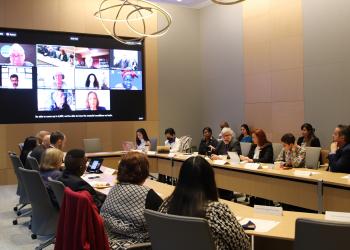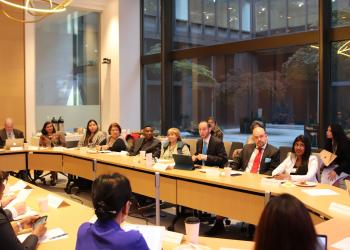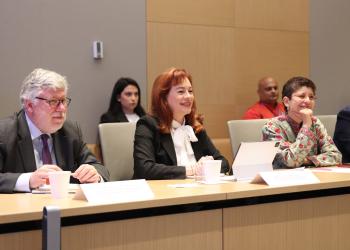Discussion series begins ongoing consultations on the future of the multilateral system
“Humanity’s welfare—and indeed, humanity’s very future—depends on solidarity and working together as a global family to achieve common goals.”
With these words, the seminal report from the Secretary-General of the United Nations laid out several dozen proposals to strengthen aspects of the multilateral system. That report and its primary objective of ensuring more effective global governance were the focus of a new series of discussions co-hosted by the Baha’i International Community and the Coalition for the UN We Need (C4UN).
The monthly series aims to provide Member States, United Nations agencies, and civil society organizations with a collaborative space to consider elements of the report, entitled Our Common Agenda, including areas that might require further consultation, such as implications at the local and national levels. The series kickoff, held today, focused on potential pathways toward the “Summit of the Future,” proposed to take place in 2023.
Attended by more than 150 participants, both online and in-person, the event began with observations from three high-level speakers: Ms. Maria Fernanda Espinosa, President of the 73rd Session of the UN General Assembly and co-Chair of the C4UN; H.E. Mr. Agustin Santo Maraver, Ambassador of the Permanent Mission of Spain to the UN; and Dr. Azza Karam, Member of the High Level Advisory Board on Effective Multilateralism and Secretary General of Religions for Peace.
In opening remarks, Ms. Fernanda Espinosa noted that the challenges facing humanity—including perverse market incentives, tribalisms, gender and other forms of inequality, and exaggerated notions of sovereignty in an interconnected world—raise fundamental questions about how the international community will choose to respond.
“These multiple crises can cause us to throw up our hands and pronounce ‘this is the best we can do,’” Ms. Fernanda Espinosa said. “Or, as we are hoping for here, they can drive us to redouble our efforts toward building a multilateral system built on justice and trust.”
Speaking from the perspective of a UN Member State, Ambassador Santos highlighted a range of practical steps and adjustments, from addressing unsustainable levels of sovereign debt and increasing rates of COVID vaccination, to increasing digitalization as a means of expanding participation and undertaking a range of reforms to the UN system itself.
The ambassador highlighted the role of normative factors as well, including issues of equity and justice. “To discuss the new common agenda framework, we need to regain the high moral ground that we have lost over the last two to three years, due to inequality,” he said.
Dr. Karam emphasized the importance of civil society organizations and individual actors leading by example in building more effective patterns of interaction. “It is essential that none of us think that the reports that are going to come out will have all the solutions we need,” she said. “Because at the end of the day, the challenge is global, but the way to react to it is inside every single one of us—to hold ourselves accountable to working together, to standing in solidarity.”
Our Common Agenda was prepared at the request of the United Nations General Assembly and addresses commitments across 12 thematic areas. Its recommendations include a new social contract anchored in human rights, renewed solidarity between peoples and future generations, a new global deal to deliver public goods and address major risks, a new agenda for peace, as well as proposals for a United Nations more suited to the needs of the 21st century.
The discussion series’ consultations are taking place in an off-the-record format, intended to give participants the greatest degree of latitude for honesty, exploration, and creative thinking. Key points and observations are being captured in two-page unattributed summaries produced after each event. A final synthesis report will be released as a substantive contribution to the proposed Summit of the Future.
Summary notes from the gathering can be found here.





